Slides with animations
Werbung
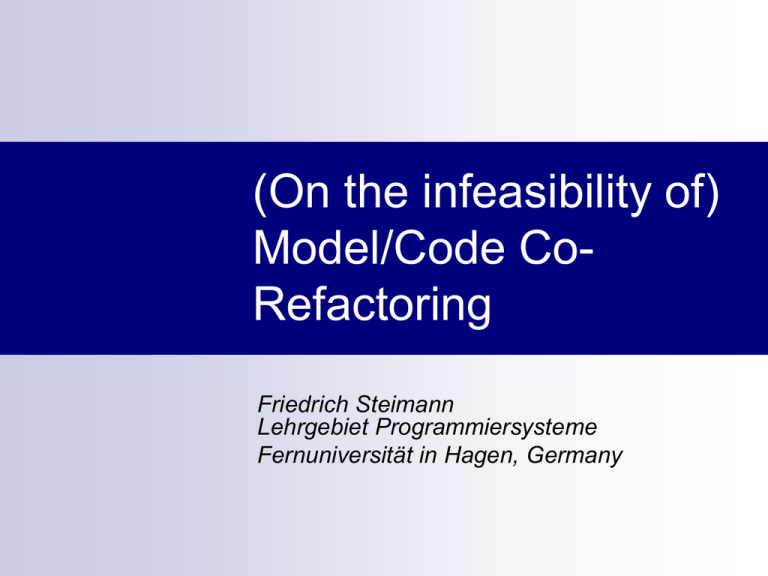
(On the infeasibility of)
Model/Code CoRefactoring
Friedrich Steimann
Lehrgebiet Programmiersysteme
Fernuniversität in Hagen, Germany
Programmiersysteme
Refactoring
Meaning-preserving change of a
software artefact with the aim of
improving one or more of its nonfunctional properties.
(extended definition)
F Steimann, J von Pilgrim Refactorings without Names ASE 2012
Programmiersysteme
Problem I
b
class A { b
private A a;
B
public void setA(A a) { … }
public A getA() { … }
}
B
a
A
Rename a
class AImpl extends A {
private Object b;
public void setB(Object b) { … }
}
AImpl aImpl = new AImpl();
aImpl.setB(aImpl);
F Steimann, J von Pilgrim Refactorings without Names ASE 2012
Programmiersysteme
Problem II
A
B
x : int
y : int
C
x : int
Pull Up Field x
public class A {}
public class B extends A {
private int x;
private int y;
…
@not_generated
public void init() {
x = 10; y = 10;
}
}
public class C extends A {
private int x;
…
}
F Steimann, J von Pilgrim Refactorings without Names ASE 2012
Programmiersysteme
Problem III
A
B
x : int = 1
y : int
C
x : int = 2
Pull Up Field y
public class A {}
public class B extends A {
private int x = 1;
private int y;
…
@not_generated
public void init() {
y = x;
}
}
public class C extends A {
private int x = 2;
…
}
F Steimann, J von Pilgrim Refactorings without Names ASE 2012
Programmiersysteme
Constraint-based refactoring
proven successful for programs
one of the few developed theories of
refactoring
encodes refactoring invariants as CSPs
originally applied to type refactorings (like
Extract Superclass)
recently generalized to other programming
constructs (names, accessibilities, etc.)
F Steimann, J von Pilgrim Refactorings without Names ASE 2012
Programmiersysteme
Constraint rules
query
constraints
r d :
bindsr, d
r.name d.name
constraint variables
F Steimann, J von Pilgrim Refactorings without Names ASE 2012
Programmiersysteme
Example
b
A a;
a = new A();
b
r d :
bindsra, da
bindsr, d
r.name d.name
ra.name = da.name
F Steimann, J von Pilgrim Refactorings without Names ASE 2012
Programmiersysteme
Refacola
refactoring
definitions
refactoring
refactoringdefinitions
definitions
programs
to be
refactored
programs
programs to
tobe
berefactored
refactored
Eclipse
AST
Xtext / Xpand / Xtend
Refacola Compiler
IDE
Refacola Framework
program
queries
writing
back
Generated Refactoring
Tools
constraint
generator
Constraint
Solver
= component dependencies
F Steimann, J von Pilgrim Refactorings without Names ASE 2012
Programmiersysteme
language UML
kinds
Class <: ENTITY { name }
Feature <: ENTITY { name, type, owner }
Attribute <: Feature
Operation <: Feature
properties
name: Identifier
type: ClassDomain
owner: ClassDomain
domains
ClassDomain = [ Class ]
queries
superclass(c: Class, super: Class)
rules
uniqueFeatureNames
for all
F1: Feature
F2: Feature
if
F1!=F2
then
superclass*(F1.owner, F2.owner) -> F1.name != F2.name
refactoring renameFeature
forced name of Feature
allowed name of Feature
refactoring pullupFeature
forced owner of Feature
allowed name of Feature,
of Refactorings
Featurewithout Names ASE 2012
F Steimann, owner
J von Pilgrim
Programmiersysteme
From refactoring to corefactoring
record transformation traces as facts
transformation of attribute to field + getter +
setter:
attribute2field(a, f)
attribute2getter(a, g)
attribute2setter(a, s)
generate constraints from trace facts
F Steimann, J von Pilgrim Refactorings without Names ASE 2012
Programmiersysteme
1.
2.
3.
4.
5.
6.
7.
8.
9.
10.
11.
12.
13.
14.
15.
16.
17.
18.
19.
20.
21.
22.
23.
language Generation
imports Java, UML
queries
class2class(cU : UML.Class, cJ : Java.Class)
attribute2field(a : UML.Attribute, f : Java.Field)
attribute2getter(a : UML.Attribute, g : Java.Method)
attribute2setter(a : UML.Attribute, s : Java.Method)
rules
attributeToFieldNames
for all
a
: UML.Attribute
f
: Java.Field
g, s : Java.Method
if
attribute2field(a, f) and attribute2getter(a, g)
and attribute2setter(a, s)
then
f.name = a.name
f.accessibility = private
g.name = "get" + a.name
g.accessibility = public
s.name = "set" + a.name
s.accessibility = public
F Steimann, J von Pilgrim Refactorings without Names ASE 2012
Programmiersysteme
Model/Code Co-Refactoring
Instrumentation
MOF Layer
Code Generation
M3
transformation language
Refactoring
Refacola
Refacola
Refacola
M2
UML
transformation
model & rules
Java
UML
refactorings
trace
rules
Java
refactorings
M1
model
transformation
trace
code
model
constraints
trace
constraints
code
constraints
factbase
CSP
query engine
instance of
data flow
F Steimann, J von Pilgrim Refactorings without Names ASE 2012
Programmiersysteme
Research Questions
1.
How often is an intended model refactoring inhibited by
implied changes of the code which would break its wellformedness or change its meaning and hence cannot be
performed?
2.
For the model refactorings implying code changes that
can be performed: How many changes are implied in the
code?
3.
How often do implied changes performed in the code
propagate back as necessary changes of the model?
4.
For the necessary changes propagated back to the
model: How often do they inhibit the refactoring?
5.
If they do not inhibit the refactoring: How many are they?
F Steimann, J von Pilgrim Refactorings without Names ASE 2012
Programmiersysteme
Evaluation
10 open source java programs
reversely engineered class diagrams
3309 classes, 3667 fields, 13196 methods
1036 classes, 878 attributes, 5975 operations
internal representation
30627 elements, 143287 facts for model
360694 elements, 534239 facts for code
14579 elements, 26006 facts for trace
F Steimann, J von Pilgrim Refactorings without Names ASE 2012
Programmiersysteme
Research Questions
1.
How often is an intended model refactoring inhibited by
implied changes of the code? In 50% of all cases!
2.
For the model refactorings implying code changes that
can be performed: How many changes are implied in the
code? 8.5 changes per refactoring!
3.
How often do implied changes performed in the code
propagate back as necessary changes of the model?
In 46% of these cases!
4.
For the necessary changes propagated back to the
model: How often do they inhibit the refactoring? 14%
5.
If they do not inhibit the refactoring: How many are they?
5.6 on average!
F Steimann, J von Pilgrim Refactorings without Names ASE 2012
Programmiersysteme
F Steimann, J von Pilgrim Refactorings without Names ASE 2012
Programmiersysteme
Chaotic transformations
Transformations may react to very small
changes
by generating largely different code.
Even if meaning-preserving,
we have no means of synchronizing
extensions.
Co-refactoring is a dead-end road.
F Steimann, J von Pilgrim Refactorings without Names ASE 2012
Programmiersysteme
Vielen Dank!
Fragen?
F Steimann, J von Pilgrim Refactorings without Names ASE 2012

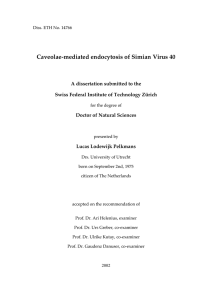
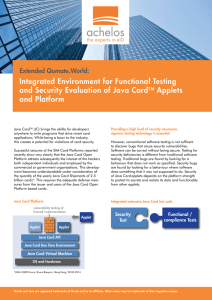
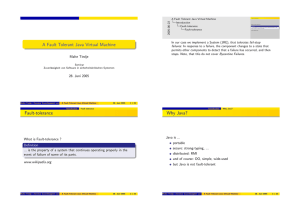
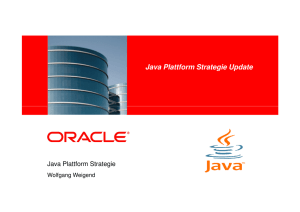
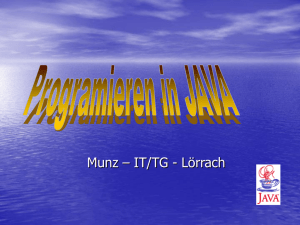
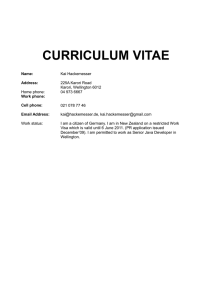
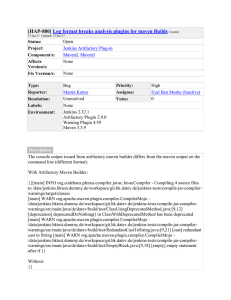
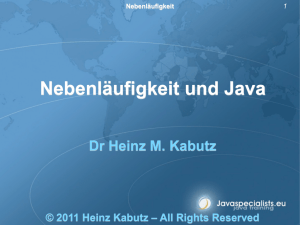
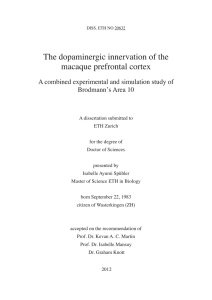
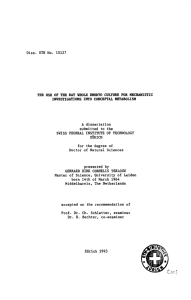
![[#BZANALYSIS-93] Simulating OpenWorkloads throws](http://s1.studylibde.com/store/data/005849429_1-b355c74cd8569694ecc2a4826cb2393e-300x300.png)